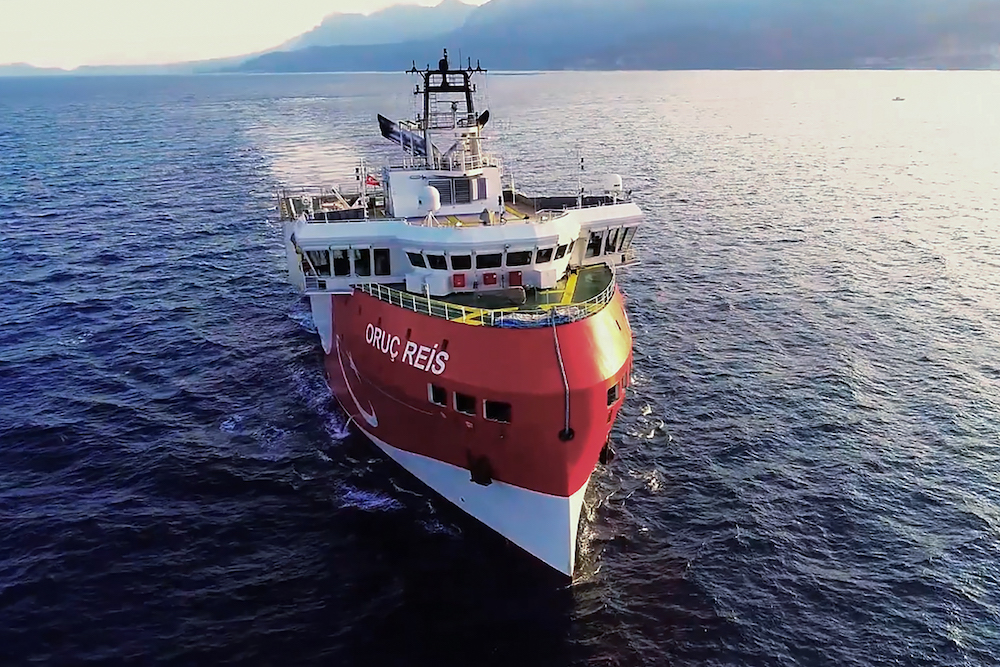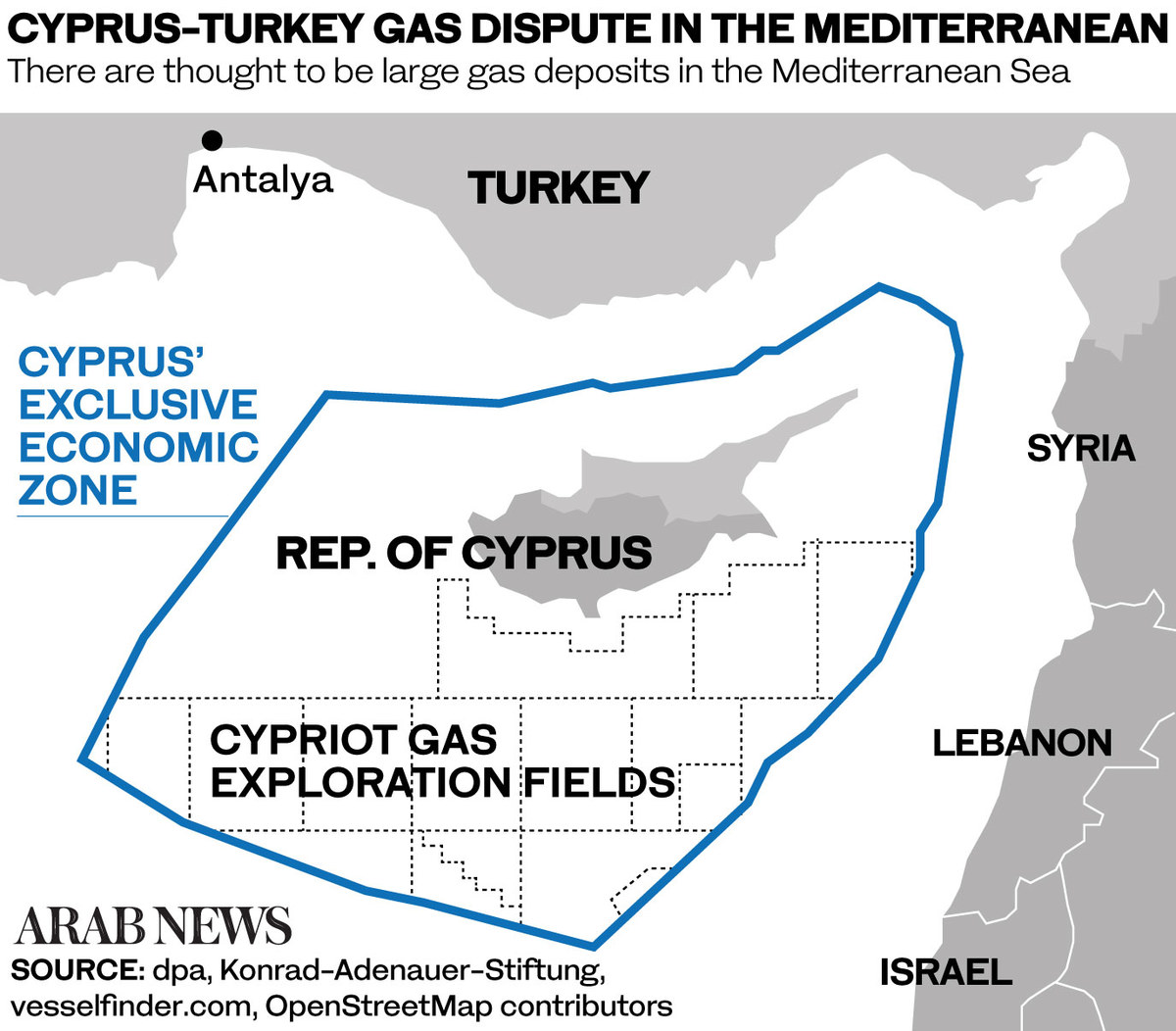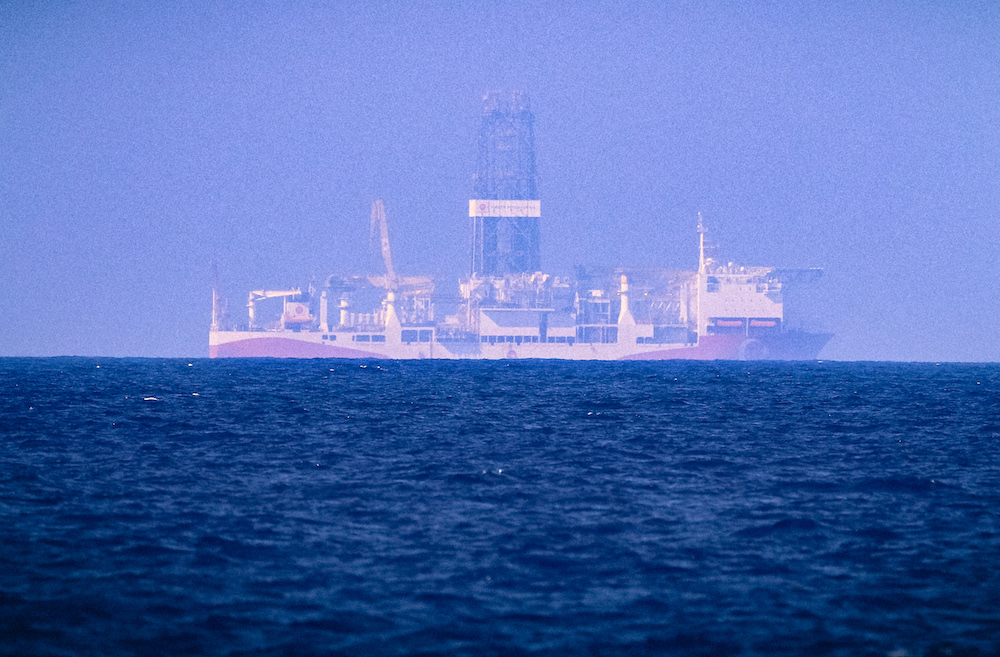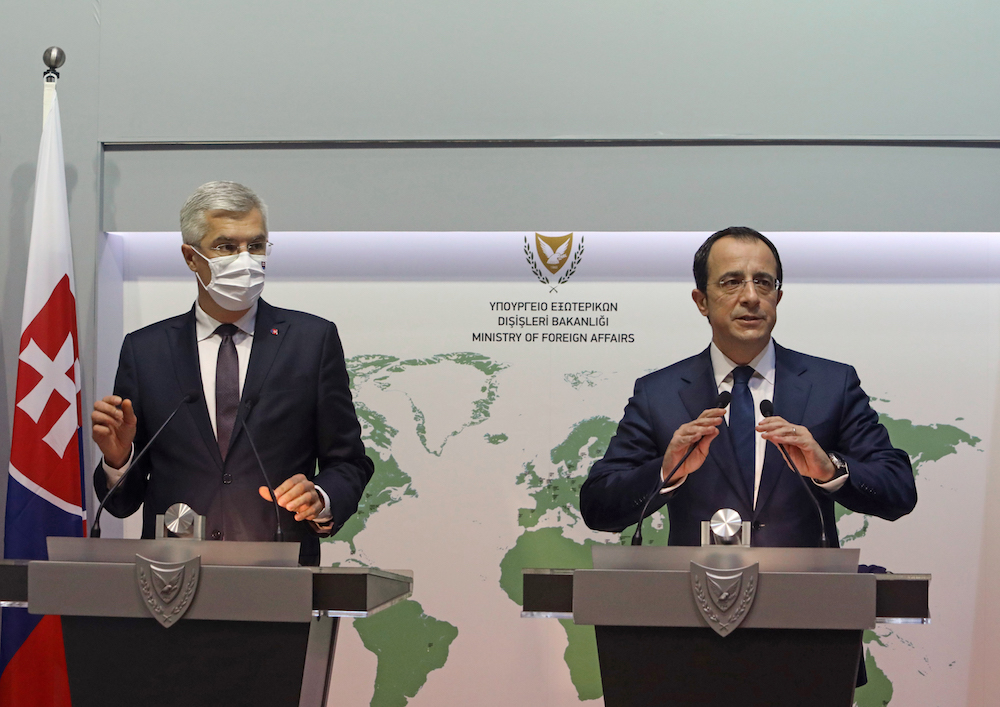DUBAI: Turkey’s latest decision to halt prospecting for oil and natural gas in the Mediterranean Sea comes just days before a meeting of European Union leaders to decide whether to penalize it for its plans for drilling activities in what Greece and Cyprus consider as part of their territorial waters. The EU leaders will decide during the Dec. 10-11 summit potential sanctions over Ankara’s activities.
Tensions between the duo, both EU members, and Turkey remain high over the latter’s sporadic forays into the contested waters. After a brief halt, Turkey resumed in mid-October its survey activities, sending back the Oruc Reis to the eastern Mediterranean. On Monday, the Turkish government announced that the vessel had completed seismic surveys and was returning to the port of Antalya.
In a Zoom interview with Arab News, Demetris Samuel, spokesperson for the Ministry of Foreign Affairs of the Republic of Cyprus, gave his government’s perspective on the gamut of issues, including diplomatic and economic ties with the Gulf countries.
Q: Turkey has been drilling for oil and gas off the coast of Cyprus, within what it calls “its continental shelf.” What can Cyprus do beyond protests and EU warnings?
A: We have gone to great lengths to delimit our maritime zones with our neighbors. We believe there needs to be dialogue with Turkey on the basis of international law, including the UN Convention on the Law of the Sea. We have delimited our maritime zones with Egypt, Israel and Lebanon and we have repeatedly called on Turkey to enter into dialogue so that we can delimit our maritime borders with Turkey as well.
Turkey has refused so far, claiming that they do not recognize the Republic of Cyprus. Over the last year and a half, Turkey has conducted six illegal drillings in either the Exclusive Economic Zone (EEZ) or continental shelf of Cyprus. They have even drilled in the territorial waters of Cyprus, within the 12 nautical miles of Cyprus. They have drilled mostly to the south of Cyprus within Cyprus and Egypt. Turkey has no right to drill where they have (drilled). They have been condemned for it (by the EU), as has the international community.

This handout photograph released by the Turkish Defense Ministry on August 12, 2020, shows Turkish seismic research vessel 'Oruc Reis' heading in the west of Antalya on the Mediterranean Sea. (AFP/Turkish Defense Ministry/File Photo)
Q: NATO Secretary-General Jens Stoltenberg has said Turkey’s latest withdrawal of the vessel Oruc Reis will “reduce tensions and make it easier to make progress also on deconfliction.” Do you see it as a positive development for the region as a whole, including Cyprus?
A: If you look at the situation on its own, it is a positive development but let’s not forget that it is a development we have seen in the past by Turkey. We know how it ends up. Turkey pulls the vessel away a few days before the next European Council in order to show our European partners that they are stepping back and giving space to dialogue. Then as soon as the council meeting is over, the drilling ship or the exploratory vessel is back out there continuing its mission. Turkey has not admitted publicly that it has pulled the ship back.
Q: Turkey has criticized the agreement between Cyprus and the US State Department on establishing a joint security training center, saying it will “damage the solution to the Cyprus problem.” What kind of a solution do you think will satisfy Turkey, which is not a party to the 1982 UN Convention on the Law of the Sea?
A: Turkey’s aim from the beginning, when it invaded Cyprus in 1974, was to have an influence and a say in what happens on the island. They have used the Turkish Cypriot community as a pretext for involvement in the island. (President) Erdogan’s only concern is to use the Turkish Cypriots to control what happens in Cyprus. Following the election in the occupied area of Ersin Tatar as the new Turkish Cypriot leader in October, the Turkish side is now even publicly speaking about a two-state solution.
Q: The recent US moves are seen by many as part of Washington’s efforts to wean Nicosia away from Moscow’s influence. Does Cyprus feel pressure from both sides to keep them happy or does it view the competition for its loyalties as entirely to its advantage?
A: Neither. We go about our foreign policy on the basis of a positive agenda. We don’t think it would be beneficial to play the US against Russia and vice versa. It is one of the pillars of our foreign policy to maintain our excellent relations with the UN Security Council members and we are very mindful that that is not affected by anything we do in a particular direction.
We are a small country with an existential problem. We have 40,000 foreign troops on our soil. We are a country that believes in international law. We attach great value to Security Council resolutions, and given that the US and Russia are both members of the UN Security Council, we are careful not to let our actions have any impact these important international actors. We do not see our foreign policy as a zero-sum game.

Q: During meetings held in August, Saudi Arabia’s Foreign Minister Prince Faisal bin Farhan reiterated Riyadh’s support for Cyprus’ sovereign rights while his Cyprus counterpart said the “the solidarity and support of countries such as Saudi Arabia” as imperative to Cyprus. How would you describe the relationship?
A: If you look at the hard facts, you can understand the importance we attach to the Gulf region. Cyprus is one of the smallest member states of the European Union yet we have one of the most extensive diplomatic networks in the region. We invest a lot in our relationship with the Gulf countries, in particular Saudi Arabia. It is worth noting that our bilateral relations have evolved rapidly over the last several years. (Since the re-establishment of diplomatic relations between Saudi Arabia and Cyprus in 2016), we have established embassies in each other’s capitals and we have exchanged a number of high-level visits.
Business relations have also thrived and, if it were not for the pandemic, we would now have direct flights between Cyprus and Saudi Arabia. Over the last four years we have covered ground that normally takes 20 to 30 years to cover in terms of rebuilding a diplomatic relationship. We have an excellent relationship with Saudi Arabia and it is one that is very dynamic and based on our mutual respect for international law.
We are present with resident missions in the entire Gulf except for Bahrain. We are now looking at the possibility of opening a diplomatic mission and an embassy in Bahrain. We attach great importance to the Gulf and we consider the Gulf to be part of the region that we are in and a very important part. We believe that what happens in the Gulf has a great impact on the broader region. We also see that there is a lot of potential in the greater region, in the Eastern Mediterranean, the Middle East and the Gulf.
Through enhancing cooperation, we feel that we can tap into this potential for the benefit of our people in the region, for the benefit of stability and security in the region. This is a region that is crucial for stability and security on a global level. If we can increase and enhance stability, cooperation and security in this region, then we will have gone (a long way toward) enhancing security and stability globally.

A picture taken on June 24, 2019 in the Mediterranean Sea off Cyprus approximately 20 nautical miles north-west of Paphos shows the drilling vessel Fatih, which was deployed by Turkey to search for gas and oil in waters considered part of the EU state's exclusive economic zone (EEZ). (AFP/File Photo)
Q: Saudi Arabia and Cyprus were keen to promote the signing of a series of bilateral agreements, to hold two business forums by the end of the year, and launch direct flights between the two countries. Are the plans on track?
A: Yes, everything is on track, but we have experienced a few delays due to COVID-19 restrictions, particularly in regards to the business forum.
Q: Cyprus and Egypt intend to build a direct marine pipeline as part of their efforts to transport natural gas from your country’s Aphrodite gas field to plants in Egypt and re-export it to Europe. Are these plans on schedule or have been disrupted by the eastern Mediterranean situation?
A: There is disruption but it is not because of the situation in the Eastern Mediterranean but because of the market situation in general in world markets when it comes to energy. The intergovernmental and legal framework for implementing these projects has been laid. However, it all depends of course on the market and how the market situation evolves. But the development of the infrastructure, because it is all going to be done with private investment, will be determined by the market factors.
The pandemic has disrupted the functioning of the market and it has affected prices, so decisions are being re-evaluated. But what does not change and will always be there is the legal framework and the intergovernmental framework that is necessary for these projects to proceed and materialize as the market determines.

Cypriot Foreign Minister Nikos Christodoulides (R) and his Slovak counterpart Ivan Korcok (L) hold a joint press conference following their meeting at the Ministry of Foreign Affairs in Nicosia, on November 23, 2020. (AFP/File Photo)
Q: In retrospect, do you think it was a mistake in January 2019 to keep Turkey out of the Eastern Mediterranean Gas Forum and deny it the advantages of lower costs and competitive prices of a regional gas market?
A: There is no country that would want to include Turkey in regional cooperation mechanisms, including energy and security networks more than we do. Why? Our approach is a pragmatic one. Geography is destiny.
If anyone would like to have a neighbor that respects international law and behaves in a way that is in line with good neighborly relations, it is us. We would like to have such a neighbor. We are the biggest supporters of Turkish EU accession process, more than anyone we like to see Turkey adjusting its foreign policy and its outlook in a way that would make it a neighbor that anyone would like to have.
We are fully supportive of including Turkey in this regional network of cooperation. Without Turkey this cooperation would never be complete; Turkey is an undeniably big and important player in the region.
However, we cannot talk about this while Turkey is threatening and violating the sovereign rights of its neighbors and disregarding flagrantly international law and UN Security Council resolutions. Look at the relations that Turkey has with countries in the region, including Egypt, Israel, Iraq, Greece and Armenia. When Erdogan came to power in 2003 his mantra was “zero problems with our neighbors.” They have gone from that to problems with every single neighbor.
Turkey wants to have this hegemonic role in the region and dictate to everyone in the region how things will be decided and determined, including how cooperation with work. This is not the model that the rest of us are working on.
Q: Do you think Turkey’s ongoing disputes with Cyprus will push Greek and Turkish Cypriots further apart or bring them closer at an emotional level and indirectly help the island’s reunification in the long run?
A: If Turkey was out of the equation, and things were left between Greek and Turkish Cypriots, the two communities on the island, we could solve the problem very quickly, even in a matter of days. Turkey uses the existence of the Turkish Cypriot community on the island as a pretext to promote what it understands as its own national interests. It doesn’t care about the well-being of the Turkish Cypriots.
Cyprus lies under the strategic belly of Turkey. Therefore, (Turkey’s) insistence to have a role in the affairs of an independent and sovereign state, a federal Cyprus that will evolve from a resolution of the Cyprus problem, is the main factor that is preventing the reunification of the island.


























